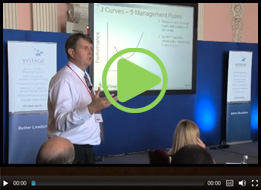
During most of my Vistage workshops, I ask the group the following question:
Who in your business is best qualified to predict and influence the future?
What do you think is the most common answer that I hear?
The CEO.
And I agree. I think that the CEO is best qualified to predict and influence the future, and that’s his job. (However, I am also asking CEOs to answer this question…)
What do you think is the second most common answer?
The sales manager.
I agree. The sales manager and sales team typically have the pulse of what orders will be coming in during the rest of the month or quarter.
The third most common answer is the operations team. They are the ones interfacing with the sales team about fulfilling future orders.
Do I ever hear that the CFO or lead accountant is the best qualified person to predict and influence the future?
Rarely.
Yet most CEOs assign control of the budget to the CFO.
If an accountant or a CFO is not the best person to predict the future, why do you make them the custodian of the budget? It’s flawed logic and you’re setting up the forecasting process to fail. (I don’t want to upset any accountants here; they should play a critically important role in this process, but it is unfair to expect them to be the custodians of the process if they are not the best qualified to predict and influence the future.)
Why do so many CEOs continue to support this flawed process?
When I ask this question, I get two answers back: One is that the forecast is about numbers, and they’re the numbers people so if they don’t do this, what will they do? The second answer is that they are the best at Excel!
Which of these answers is worse?
Both are bad; if you’ve selected the custodian of your future based on their Excel skills, you’re in trouble. (Excel skills are great for manipulating numbers that others input and influence, but not for determining key numbers based on future business events.)
And the very first mistake that most businesses make in forecasting is that the CEO assumes it’s solely about numbers and jumps into the numbers too quickly. Isn’t this why so many mid-market companies give up on forecasting altogether? When it’s never accurate, why waste the time?
As you’re reflecting on 2016 and thinking about changes you’ll make in 2017, consider revising your forecasting process. Here’s what I recommend to my Vistage groups and clients:
- Determine your core forecasting team – the people with the pulse of the future of the business
- Follow this monthly forecasting process
- Use SON communication to eliminate SILO mentality
- Work with your CFO or controller to input the numerical results into a 24 month rolling model
I’ve seen this process transform many CEOs’ ability to successfully predict the future of their businesses.
Merry Christmas!
Video
Nick Setchell's Top 5 Tips to Improve Your Business
This session combines all the powerful and popular concepts of Fiscal Focus with other concepts to assist you manage your people, market, and foundation values.


